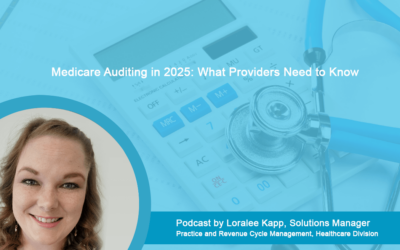Outsource Strategies International (OSI) has vast experience in billing, coding and insurance verification for all medical specialties. Our staff stays up to date with changing codes and billing rules, helping practices improve compliance, prevent claim denials, and boost revenue.
In today’s podcast, Meghann Drella, one of our Senior Solutions Managers, discusses key billing and coding strategies to improve practice revenue.
Read Transcript
Hello and welcome to our podcast series. My name Is Meghann Drella and I am a Senior Solutions Manager here at Outsource Strategies International. Today, I will be discussing coding and billing strategies to boost compliance and revenue. Staying financially healthy is not easy as practices transition from the fee for service model to value-based care. Here are some smart coding and billing strategies to improve compliance and ensure a better bottom line.
- Coding compliance: Compliant coding is crucial to avoid audits and plug revenue leaks. Ways to avoid common coding errors that can cause billing mistakes:
- Understand how to use diagnosis and procedure codes common in your practice: Correct CPT and ICD-10 codes are essential for obtaining maximum reimbursement for E/M and office visits. Coding completely and accurately is crucial not only for reimbursement but also to meet quality measures. Incomplete or inaccurate code descriptions on encounter forms, cheat sheets, and electronic charge systems are common errors. Take care to link diagnosis codes to the relevant CPT codes.
- Use modifiers correctly: Modifiers can be used with CPT and HCPCS to inform the payer of special circumstances. Not using a modifier or using the wrong one can lead to billing errors and claim denial.
- Know how to report telemedicine services: While telemedicine enhances patient access and satisfaction, experts say that getting paid for these services can pose problems. Providers need to know the latest CPT/HCPCS codes applicable to telemedicine. Place of service code 02 should be reported to show that the professional telehealth service was provided from a distant site. If the services were furnished via a synchronous interactive communication, some payers may require modifier -95. Know Medicare and commercial payer rules for telemedicine.
- Avoid chronic care management (CCM) denials: The common reasons for CCM denials are: several providers billing CCM for the same patient during the same 30 days, CCM billed more than once every 30 days by the physician, and inadequate documentation. To address the first two concerns, practices need to communicate with specialists as to who will bill for CCM and set up an alert in the practice management system to ensure that CCM is billed at the correct time, respectively. It is important to ensure that documentation describes the patient’s condition with as much specificity as possible and matches the intent of the code reported.
- Prevent Billing Mistakes – Follow best practices and keep track vital metrics. Here are some tips to prevent common billing mistakes:
- Verifying insurance and insurance authorization are critical to determine patient coverage and responsibility prior to the office visit. Lack of proper eligibility and benefit verification can lead to delayed payments, reworks, decreased patient satisfaction, increased errors, and nonpayment. A Physicians Practice article says that not verifying insurance can lead to billing the wrong payer.
- Keep track of key metrics:
- Net collections
- Average collections per encounter
- Days in AR
- Charge lag time
According to Physicians Practice, the goal should be to reduce lag to less than 5 days for office-based services and 12 days for combined hospital and office-based services.
- Double check claims before submission: Omitting even the smallest detail or making a spelling mistake in a claim can lead to denial. Practices need to ensure that all the fields in the claim are properly filled out.
Practices also need to keep up to date on new coding rules and initiatives as well as payer rules to improve revenue and avoid potential compliance risks. Thank you for listening to my podcast and please stay tuned for next week’s podcast.



